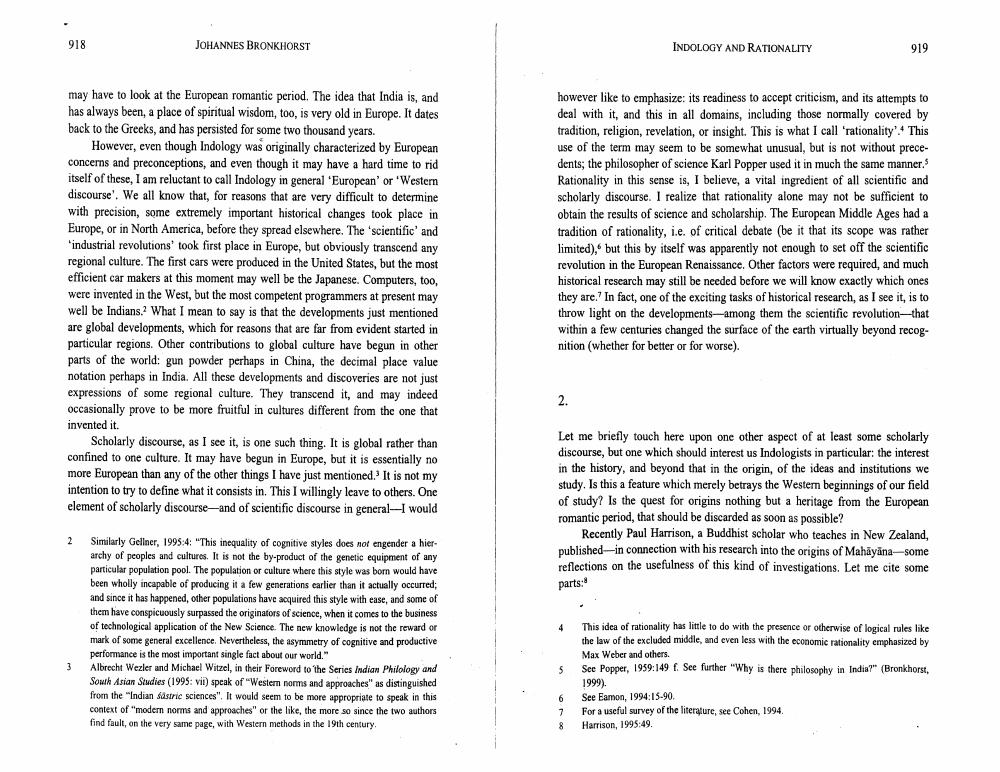Book Title: Indology And Rationality Author(s): Johannes Bronkhorst Publisher: Johannes Bronkhorst View full book textPage 2
________________ . JOHANNES BRONKHORST INDOLOGY AND RATIONALITY 919 may have to look at the European romantic period. The idea that India is, and has always been a place of spiritual wisdom, too, is very old in Europe. It dates back to the Greeks, and has persisted for some two thousand years. However, even though Indology was originally characterized by European concerns and preconceptions, and even though it may have a hard time to rid itself of these, I am reluctant to call Indology in general European' or 'Western discourse'. We all know that, for reasons that are very difficult to determine with precision, some extremely important historical changes took place in Europe, or in North America, before they spread elsewhere. The 'scientific and 'industrial revolutions took first place in Europe, but obviously transcend any regional culture. The first cars were produced in the United States, but the most efficient car makers at this moment may well be the Japanese. Computers, too, were invented in the West, but the most competent programmers at present may well be Indians. What I mean to say is that the developments just mentioned are global developments, which for reasons that are far from evident started in particular regions. Other contributions to global culture have begun in other parts of the world: gun powder perhaps in China, the decimal place value notation perhaps in India. All these developments and discoveries are not just expressions of some regional culture. They transcend it, and may indeed occasionally prove to be more fruitful in cultures different from the one that invented it. Scholarly discourse, as I see it, is one such thing. It is global rather than confined to one culture. It may have begun in Europe, but it is essentially no more European than any of the other things I have just mentioned. It is not my intention to try to define what it consists in. This I willingly leave to others. One element of scholarly discourse-and of scientific discourse in general—I would however like to emphasize: its readiness to accept criticism, and its attempts to deal with it, and this in all domains, including those normally covered by tradition, religion, revelation, or insight. This is what I call rationality. This use of the term may seem to be somewhat unusual, but is not without precedents; the philosopher of science Karl Popper used it in much the same manner. Rationality in this sense is, I believe, a vital ingredient of all scientific and scholarly discourse. I realize that rationality alone may not be sufficient to obtain the results of science and scholarship. The European Middle Ages had a tradition of rationality, i.e. of critical debate (be it that its scope was rather limited), but this by itself was apparently not enough to set off the scientific revolution in the European Renaissance. Other factors were required, and much historical research may still be needed before we will know exactly which ones they are. In fact, one of the exciting tasks of historical research, as I see it, is to throw light on the developments-among them the scientific revolution-that within a few centuries changed the surface of the earth virtually beyond recog. nition (whether for better or for worse). Let me briefly touch here upon one other aspect of at least some scholarly discourse, but one which should interest us Indologists in particular: the interest in the history, and beyond that in the origin, of the ideas and institutions we study. Is this a feature which merely betrays the Western beginnings of our field of study? Is the quest for origins nothing but a heritage from the European romantic period, that should be discarded as soon as possible? Recently Paul Harrison, a Buddhist scholar who teaches in New Zealand, published in connection with his research into the origins of Mahayana-some reflections on the usefulness of this kind of investigations. Let me cite some parts: Similarly Gellner, 1995:4: "This inequality of cognitive styles does not engender a hierarchy of peoples and cultures. It is not the by-product of the genetic equipment of any particular population pool. The population or culture where this style was born would have been wholly incapable of producing it a few generations earlier than it actually occurred; and since it has happened, other populations have acquired this style with case, and some of them have conspicuously surpassed the originators of science, when it comes to the business of technological application of the New Science. The new knowledge is not the reward or mark of some general excellence. Nevertheless, the asymmetry of cognitive and productive performance is the most important single fact about our world." Albrecht Wezler and Michael Witzel, in their Foreword to the Series Indian Philology and Sowih Asian Studies (1995: vil) speak of Western norms and approaches" as distinguished from the Indian Sastric sciences". It would seem to be more appropriate to speak in this context of "modern norms and approaches" or the like, the more so since the two authors find fault, on the very same page, with Western methods in the 19th century, 5 This idea of rationality has little to do with the presence or otherwise of logical rules like the law of the excluded middle, and even less with the economic rationality emphasized by Max Weber and others. Sce Popper, 1959:149 f. See further "Why is there philosophy in India?" (Bronkhorst, 1999) See Eamon, 1994:15-90, For a useful survey of the literature, see Cohen, 1994 Harrison, 1995:49. 7 8Page Navigation
1 2 3 4 5 6 7 8 9 10 11 12 13
